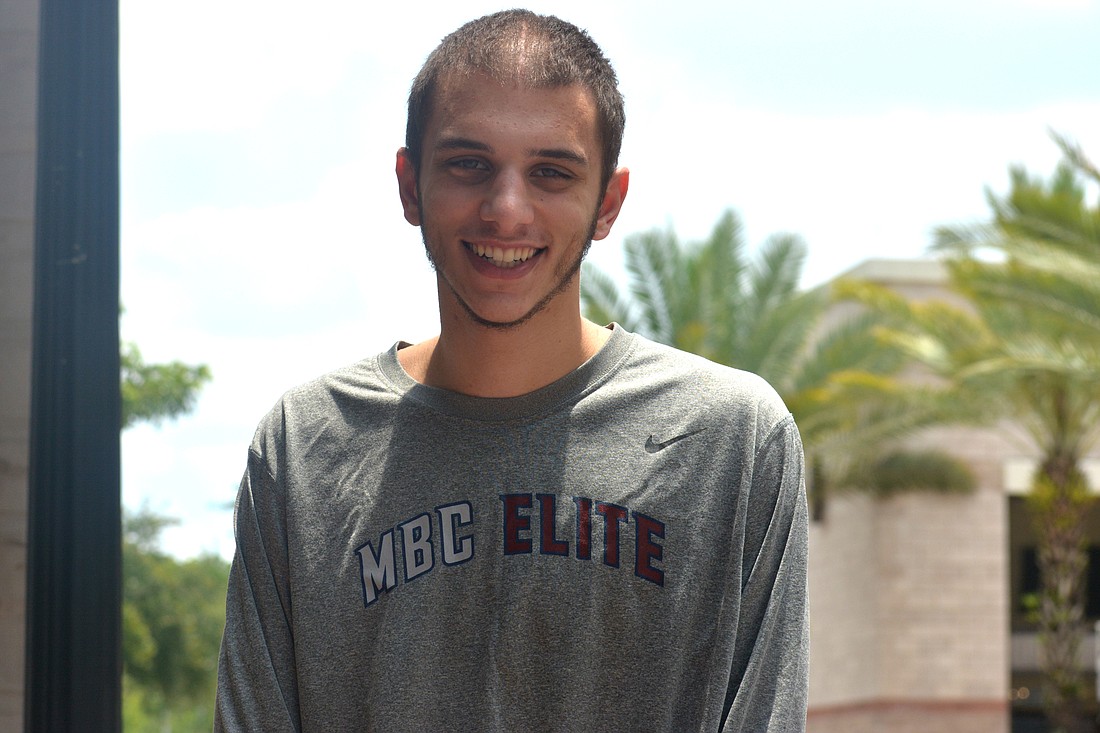- November 23, 2024
-
-
Loading

Loading

Three weeks after a Feb. 28 car crash left him hospitalized at Sarasota Memorial Hospital with a traumatic brain injury, Mill Creek's Jack Kelley experienced an emotional moment.
The 19-year-old was staring at the hospital ceiling, and his mind finally became clear after he had been in a medically-induced coma for two weeks followed by another week of treatments.
In that moment, everything clicked about what had happened to him, and he didn't like the picture. Hearing about the hit-and-run crash on Tamiami Trail in Bradenton — the Florida Highway Patrol arrested Bradenton's Zachari Brock a few days after the accident for leaving the scene — was one thing, but understanding its consequences was another.
He understood the odds of returning to a normal life might not be good. His tears finally flowed.
Besides his brain injury, he had broken six ribs, two vertebrae and both scapulas. He had 81 staples in his head sewing shut the seam under which lay not skull, but titanium mesh.
The moment didn't last long. Kelley decided to get to work.
On May 9 at the lobby of his Sarasota apartment complex, where he lives now while attending State College of Florida, Manatee-Sarasota, Kelley couldn't remember anything about the accident. The last thing the Lakewood Ranch High graduate could recall was working on a poetry project at a friend’s house in Mill Creek.
His speech has returned to normal, though, and he sounded like the star basketball player who would answer questions by the media after a Lakewood Ranch High victory. He said a day earlier, he had shot baskets in the gym, the second time he had done so since the accident. The first time he shot around with his former Mustangs teammate, Evan Spiller.
“It was a little depressing, honestly,” Kelley said. “My body is just weak. I made, like, two of 100 3-pointers. But I am improving.”
Kelley was cleared to run, jump and do other exercises last week. Doctors consider his recovery miraculous to this point, following a five-week stay at the hospital. On the first day he was fully conscious, he used a walker to move around the hospital. The next day, he didn’t need the walker.
It was the first of many times Kelley surprised the medical staff. One doctor told Kelley he didn't think he would live and said only about 20% of those who have suffered similar injuries have survived.
From Sarasota Memorial, Kelley continued his progress at Atlanta’s Shepherd Center, which specializes in spinal cord and brain injury rehabilitation. There, he would undergo three types of therapy. Physical, which focused on getting back his basic strength and balance; Occupational, which challenged Kelley’s reflexes and attention to detail, as well as preparing for his return to school; and Speech, which focused on Kelley’s cognitive functions, like giving him deductive reasoning problems to solve.
Kelley said the center’s exercises were “no joke.” He would ask for breaks and be pushed to his limits before he received one. It was hard, he said, but good for him. It helped him make progress quickly — quicker than anyone thought possible.
Kelley was supposed to be at Shepherd Center for four to six weeks. On the fourth day, the center labeled him “independent,” meaning he no longer required constant supervision from the staff, instead getting his own space when not in physical, occupational or speech therapy.
On the eighth day, Kelley was released.
He flew home, where his family was waiting for him, and got to sleep in his own bed. That, Kelley said, was the best feeling after weeks of uncomfortable arrangements.
There is a nagging thought in Kelley’s mind, one that resonated with him when he saw all the other patients at Shepherd who were not progressing as fast as him, or may never regain their former abilities.
“I did not do anything to deserve to be this healthy,” Kelley said. “It was just my brain… I feel a little guilty.”
Kelley’s journey back to the status quo still has a few obstacles. He is going to therapy three times a week, two sessions each day, rotating between physical, occupational and speech. Though doctors have told Kelley he cannot play competitive contact sports again, lest he receive a blow to his head, he can shoot the ball with friends and even play two-on-two, as long as his friends don’t mind a lack of physicality.
There are other effects. Kelley is now deaf in his right ear. His mental stamina is not where it was. Kelley said, for example, while working on a puzzle, he can register when he is losing the ability to solve it. But he plans on attending Florida Atlantic University in the fall, majoring in computer science and pre-engineering.
When all could have easily been lost, Kelley relishes what he has, and what his future could be.
Kelley’s next goal, he said, is to dunk a basketball by mid-July.
As he has shown, nothing is impossible.